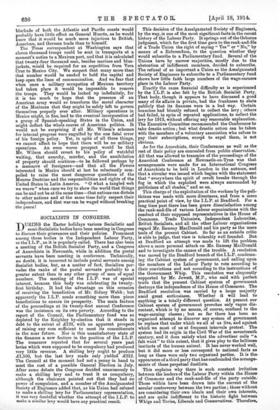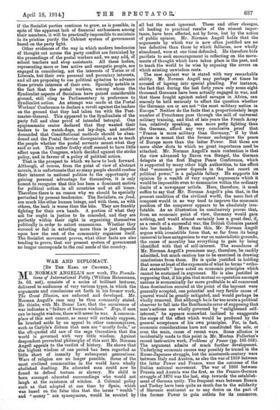SOCIALISTS IN CONGRESS.
DURING the Easter holidays various Socialistic and semi-Socialistic bodies have been meeting in Congress to discuss their grievances and their policies. Prominent among these bodies is the Independent Labour Party, or the I.L.P., as it is popularly called. There has also been a meeting of the British Socialist Party, and a Congress of Anarchists in Newcastle, while in addition the postal servants have been meeting in conference. Technically, no doubt, it is incorrect to include postal servants among Socialist bodies, but, as a matter of fact, Socialism per- vades the ranks of the postal servants probably to a greater extent than in any other group of men of equal numbers. The meeting of the I.L.P. was of special interest, because this body was celebrating its twenty- first birthday. It had the advantage on this occasion of receiving the benediction of Mr. Sidney Webb ; but apparently the I.L.P. needs something more than pious benedictions to ensure its prosperity. The main feature of the proceedings at its twenty-first annual Conference was the insistence on its own poverty. According to the report of the Council, the Parliamentary fund was so depleted by the Keighley by-election that it stands in debt to the extent of £133, with no apparent prospect of raising any sum sufficient to meet its commitments in the near future. Nor is this unsatisfactory state of the finances a new feature in the position of the LL.P. The treasurer reported that for several years past levies which were supposed to be compulsory had produced very little revenue. A shilling levy ought to produce -91,500, but the last levy made only yielded £312. The Council at the moment had not 'a penny in hand to meet the cod of a possible General Election in July. After some debate the Congress decided unanimously to make a shilling levy and to treat it as compulsory, although the chairman pointed out that they had no power of compulsion, and a member of the Amalgamated Society of Engineers added that, as his Union had refused to make a shilling levy for Parliamentary representation, it was very doubtful whether the attempt of the I.L.P. to make a similar levy would have any practical result. This decision of the Amalgamated Society of Engineeri, by the way, is one of the most significant facts in the recent
history of the Labour Party. It springs out of the Osborne judgment, which for the first time gave to the rank-and-file of a Trade Union the right of saying " Yes " or "No," by means of a Referendum, to the question whether they would subscribe to a Parliamentary fund. Several of the Unions have by narrow 'majorities, mostly due to the abstention of indifferent members, decided to subscribe. The refusal of so important a Union as the Amalgamated Society of Engineers to subscribe to a Parliamentary fund shows how little faith large numbers of the wage-earners place in the Labour Party. Exactly the same financial difficulty as is experienced by the I.L.P. is also felt by the British Socialist Party.
That body, though it appears to have discussed a good
many of its affairs in private, had the frankness to state publicly that its finances were in a bad way. Certain
branches had bluntly refused to collect the levy ; others
had failed, in spite of repeated applications, to collect this levy for 1913, without offering any reasonable explanation.
The Executive Committee recommended the Conference to take drastic action ; but what drastic action can be taken with the members of a voluntary association who refuse to pay their subscriptions, except to expel them, is not obvious.
As for the Anarchists, their Conferences as well as the rest of their policy are concealed from public observation.'
All that was allowed to transpire of the proceedings of the Anarchist Conference at Newcastle-on-Tyne was that arrangements were made for an International Congress
of Anarchists to be held in London in the autumn, and that a circular was issued which begins with the statement that "everywhere the spirit of revolt breaks through the fog in which the exploited were always surrounded by politicians of all shades," and so on.
This charge of the exploitation of the workers by the poli- ticians was made with more directness, and from a more practical point of view, by the I.L.P. at Bradford. For a long time past there has been grave dissatisfaction among the rank-and-file of various Labour organizations with the conduct of their supposed representatives in the House of Commons. Trade Unionists, Independent Labourites, British Socialists, and all the other Labour organizations regard Mr. Ramsay MacDonald and his party as the mere tools of the present Cabinet. So far as an outside critic is able to judge, that view is tolerably well founded. But at Bradford an attempt was made to lift the problem
above a mere personal attack on Mr. Ramsay MacDonald and to investigate the cause& of the trouble. A resolution
was moved by the Bradford branch of the I.L.P. condemn-
ing the Cabinet system of government, and calling upon the members of the Labour Party to vote according to
their convictions and not according to the instructions of the Government Whip. This resolution was eloquently supported by Mr. Jowett, M.P., who said with perfect truth that the present Cabinet system of government
destroys the independence of the House of Commons. The Bradford resolution was carried by a large majority
amid great enthusiasm. Whether it will lead to anything is a totally different question. At present our Cabinet system of government provokes only vague dis- content, which is by no means, of course, confined to the wage-earning classes ; but so far there has been no organized attempt to discover any system of government to replace that under which we all of us live, and against which we most of us at frequent intervals protest. The system had its origin in the Civil War of the seventeenth
century, and it does satisfy what the advertiser calls "a felt want" to this extent, that it gives play to the bellicose instincts of the human animal. It has never worked well, but it did more or less correspond to national facts as long as there were only two organized parties. It is the appearance of a third party that has confounded the arrange, ments of these perpetual duellists.
This explains why there is such constant irritation between the leaders of the Labour Party within the House of Commons and the rank-and-file of the party outside.
Those within have been drawn into the current of the secular controversy between the two parties ; those without
are considering their own ideals and their own interests, and are quite indifferent to the historic fight between Whigs and Tories, Liberals and Conservatives. Therefore, if the Socialist parties continue to grow, as is possible, in spite of the apparent lack of financial enthusiasm among their members, it will be practically impossible to maintain in its pristine purity the Cabinet system of government based on the party fight.
Other evidences of the way in which modern tendencies of thought cut across the party conflict are furnished by the proceedings of the postal workers and, we may add, of school teachers and shop assistants. All these bodies, representing more or less active and energetic people, are engaged in considering, not the interests of Tories or of Liberals, but their own personal and pecuniary interests, and all are proposing to use political agitation to advance these private interests of their own. Specially notable is the fact that the postal workers, among whom the Syndicalist aspects of Socialism have gained considerable ground, still cling to Parliamentary in preference to Syndicalist action. An attempt was made at the Postal Workers' Conference to declare a revolt against the leaders on the ground that they had taken tea with the Post- master-General. This appeared to the Syndicalists of the party full and clear proof of intended betrayal. One epigrammatic orator declared that they wanted their leaders to be watch-dogs, not lap-dogs, and another demanded that Constitutional methods should be aban- doned and the Postal Service disorganized, so as to teach the people whether the postal servants meant what they said or not. This rather frothy stuff seemed to have little effect upon the Congress, which decided against the strike policy, and in favour of a policy of political action. That is the prospect to which we have to look forward. Although, of course, from the point of view of abstract morals, it is unfortunate that so many people should confine their interest in national politics to the opportunity of gaining personal advantage for themselves, it is only honest to recognize that this has been a dominant motive for political action in all countries and at all times. Therefore there is no reason why we should be specially perturbed by present tendencies. The Socialists, an fond, are much like other human beings, and with them, as with others, the bark is worse than the bite. They are frankly fighting for their own hands. A portion of what they ask for ought in justice to be conceded, and they are perfectly within their right in organizing themselves politically in order to extort concessions. Whether they succeed or fail in extorting more than is just depends upon how the rest of the community organizes itself. The Socialist movement proves, what other facts are also tending to prove, that our present system of government no longer corresponds to the real needs of the country.











































 Previous page
Previous page